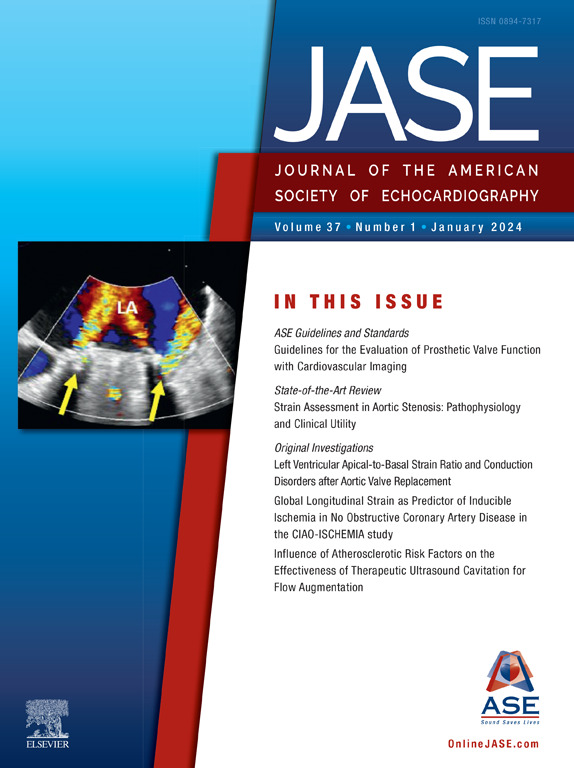Impact of Renal Function on Myocardial Remodeling and Outcomes in Patients With Moderate Aortic Stenosis
IF 6
2区 医学
Q1 CARDIAC & CARDIOVASCULAR SYSTEMS
Journal of the American Society of Echocardiography
Pub Date : 2025-08-01
DOI:10.1016/j.echo.2025.04.008
引用次数: 0
Abstract
Background
Patients with moderate aortic stenosis (AS) and cardiac damage have poor prognosis, and whether early aortic valve replacement benefits these patients is under investigation. However, besides valvular hemodynamics, comorbidities such as chronic kidney disease (CKD) can contribute to myocardial damage and affect prognosis. The aim of this study was to investigate the impact of renal function on myocardial remodeling and outcomes in patients with moderate AS.
Methods
The study cohort included 865 consecutive patients diagnosed with moderate AS (aortic valve area > 1.0 and ≤1.5 cm2, mean gradient > 20 mmHg) between 2008 and 2020. Patients were categorized into five stages of CKD according to estimated glomerular filtration rate. Echocardiographic measures of myocardial remodeling and the composite outcome of all-cause mortality and heart failure hospitalization were assessed.
Results
Higher CKD stage was associated with greater valvuloarterial impedance, as well as greater left ventricular (LV) hypertrophy, worse LV diastolic function, and lower LV and left atrial strain, despite similar AS severity. These associations were independent of age, sex, comorbidities, and LV pressure overload. During a median follow-up period of 4.0 years, 310 composite outcome events (39.3%) occurred, including 258 deaths (32.7%). Severe CKD (stage 4 or 5) and myocardial dysfunction were independent predictors of the composite outcome, after adjustment for key clinical variables including aortic valve replacement. Mediation analysis showed that myocardial dysfunction partially mediated the impact of renal function on outcome.
Conclusions
In patients with moderate AS, renal dysfunction was independently associated with adverse myocardial remodeling and dysfunction, irrespective of valvular hemodynamics. The role of earlier intervention in patients with moderate AS whose cardiac damage is driven by comorbidities, rather than AS itself, warrants further investigation.
中度主动脉瓣狭窄患者肾功能对心肌重构及预后的影响。
中度主动脉瓣狭窄(AS)和心脏损伤患者预后较差,早期主动脉瓣置换术是否有利于这些患者,目前正在研究中。然而,除了瓣膜血流动力学,合并症,如慢性肾脏疾病(CKD)可导致心肌损伤并影响预后。我们研究了肾功能对中度AS患者心肌重塑和预后的影响。方法:研究队列纳入了2008年至2020年间865例连续诊断为中度AS(主动脉瓣面积>1.0和≤1.5 cm2,平均梯度>20 mmHg)的患者。根据肾小球滤过率将患者分为5个阶段。超声心动图测量的心肌重塑和综合结果的全因死亡率和心力衰竭住院进行评估。结果:尽管as严重程度相似,但较高的CKD分期与较大的瓣膜动脉阻抗、较大的左室肥厚、较差的左室舒张功能以及较低的左室和左心房应变相关。这些关联与年龄、性别、合并症和左室压力过载无关。在中位随访4年期间,共发生310例复合结局事件(39.3%),包括258例死亡(32.7%)。在调整了包括主动脉瓣置换术在内的关键临床变量后,严重CKD(4-5期)和心肌功能障碍是复合结局的独立预测因素。中介分析显示心肌功能障碍在一定程度上介导了肾功能对预后的影响。结论:在中度AS患者中,肾功能障碍与不良心肌重构和功能障碍独立相关,而与瓣膜血流动力学无关。早期干预在心脏损伤是由合并症而非AS本身引起的中度AS患者中的作用值得进一步研究。
本文章由计算机程序翻译,如有差异,请以英文原文为准。
求助全文
约1分钟内获得全文
求助全文
来源期刊
CiteScore
9.50
自引率
12.30%
发文量
257
审稿时长
66 days
期刊介绍:
The Journal of the American Society of Echocardiography(JASE) brings physicians and sonographers peer-reviewed original investigations and state-of-the-art review articles that cover conventional clinical applications of cardiovascular ultrasound, as well as newer techniques with emerging clinical applications. These include three-dimensional echocardiography, strain and strain rate methods for evaluating cardiac mechanics and interventional applications.

 求助内容:
求助内容: 应助结果提醒方式:
应助结果提醒方式:


